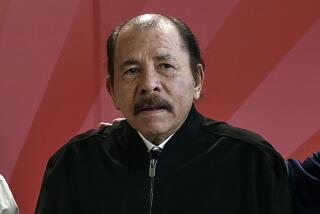U.N. Commission Renews Special Probes of Rights Abuses in Afghanistan, Chile and Iran
- Share via
GENEVA — The U.N. Human Rights Commission ended a politically acrimonious annual meeting Friday, adopting a final report that included strong criticism of Afghanistan, Chile and Iran.
The 43-nation commission approved 61 resolutions, including decisions to renew the mandates of special investigators to look into alleged murder and torture by the governments of those three countries.
Delegates also extended the mandate of a special rapporteur, or investigator, on El Salvador.
But after a lengthy debate Friday evening, they terminated the mandate of a special investigator on Guatemala and, in recognition of efforts by the Guatemalan government to improve its human rights situation, appointed instead an expert to monitor progress.
‘Just Politics’
“The special rapporteurs are the soul of the process here,” said one delegate from a human rights group who asked not to be named. “The resolutions put forth are just politics.”
Claude-Albert Colliard, head of the French delegation, said, “Unfortunately, this commission was very politicized on two points--Cuba and Afghanistan.”
The United States launched a major diplomatic attack on Cuban President Fidel Castro at the six-week session, alleging his jails held up to 15,000 political prisoners. Many delegates privately said the campaign was motivated by East-West rivalry.
The commission narrowly shelved the U.S. motion by one vote--a defeat for Vernon A. Walters, the American ambassador to the United Nations, who pleaded for support in a speech here.
Delegates agreed that a major victory was an announcement by Afghanistan’s Foreign Minister Abdul Wakil that a U.N. special rapporteur would be allowed to enter the country to investigate allegations of murder and torture.
Three-Year Refusal
The Moscow-backed Communist authorities in Kabul had refused to let the investigator, Austrian Felix Ermacora, enter during the last three years.
“Ermacora’s being invited to Afghanistan is a very big step, with potential for progress,” commented one delegate from a human rights organization.
Ermacora’s previous reports alleging murder and torture by Afghan and “foreign troops” were based on interviews with Afghan refugees in Pakistan. His reports made no direct reference to the estimated 115,000 Soviet forces in Afghanistan.
A resolution condemning Iran was narrowly adopted after almost being dropped from consideration.
Eighteen states voted for the motion, including the United States and major West European states, while five voted against it and 16 abstained.
More to Read
Sign up for Essential California
The most important California stories and recommendations in your inbox every morning.
You may occasionally receive promotional content from the Los Angeles Times.










